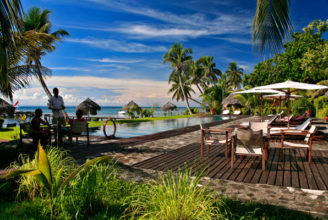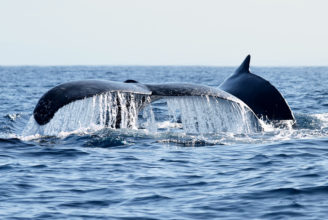Whale Watching from Saint Marie Island
Watch Humpback Whales
In July and August humpback whales migrate to Malagasy waters to calve and mate (they don’t feed during that time), so Saint Marie Island is traditionally regarded as one of the more rewarding whale-watching sites.
Saint Marie Island: Madagascar’s Humpback Whale Nursery
Île Sainte-Marie (also known as Nosy Boraha) is globally recognized as one of the very best places in the world to witness the annual migration of the majestic Humpback Whale (Megaptera novaeangliae).
The channel separating this pristine island from the east coast of Madagascar transforms into a sheltered, tropical sanctuary as the whales complete their epic annual journey from the frigid waters of Antarctica.
The Seasonal Spectacle
The whale migration to Sainte Marie is a highly anticipated natural event focused on reproduction, creating a truly spectacular marine safari opportunity.
| Detail | The Experience |
| Whale Species | The star attraction is the Humpback Whale (Megaptera novaeangliae). |
| Why they visit | The warm, shallow, protected waters of the Sainte Marie Channel are an ideal location for mating, calving, and nursing their young. The whales do not feed here. |
| The Display | Visitors frequently witness dramatic behaviours such as breaching (leaping fully out of the water), tail-slapping, and competitive social groups of males vying for the attention of females. |
| Underwater Song | Many reputable tour operators utilize hydrophones (underwater microphones) to allow guests to listen to the haunting, complex “songs” of the male Humpbacks. |
Best Time to Visit
Timing is everything for a successful whale watching trip, and the season at Sainte Marie is famously consistent:
- Peak Season: July and August offer the highest concentration of whales and the most frequent sightings. This period corresponds with the peak of mating activity and the birth of new calves.
- Whale Season Window: Late June to September. The first arrivals begin in June, and some whales remain into late September before starting their return migration south to the Antarctic feeding grounds.
Choosing a Responsible Safari
Sainte Marie has been a dedicated hub for whale research and eco-tourism for decades. We highly recommend choosing operators who prioritize the welfare of the whales:
- Eco-Guides & Scientists: Many local tours partner with or follow the guidelines set by conservation associations like CétaMada or Megaptera. These tours are often led by certified guides or even include onboard scientists who are collecting valuable research data.
- Code of Conduct: Reputable operators adhere to a strict marine mammal watching code of conduct, ensuring boats maintain safe distances, approach whales correctly, and turn off their engines when close to mother-calf pairs.
- A Unique Opportunity: Booking a trip with a conservation-focused partner means your experience is not just a holiday excursion, but a contribution to the scientific monitoring and protection of these magnificent animals.
This combination of idyllic island scenery and world-class marine wildlife viewing makes a whale watching trip from Saint Marie Island one of the most enriching experiences Madagascar has to offer.
Local Hotels

Unsure Where To Start?
Let’s talk about your Earth Trip


Our travel specialists are seasoned explorers with deep local insights. Whether it’s uncovering hidden gems or planning immersive cultural experiences, we design trips that go beyond the ordinary. Get in touch today!
Request A Video Meeting












 Whale Watching from Saint Marie Island
Whale Watching from Saint Marie Island